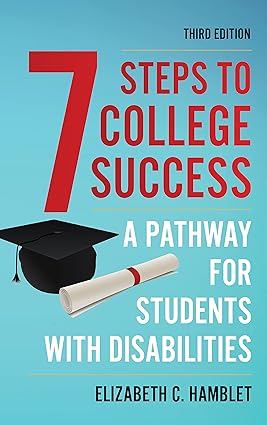
A generation ago, college would have been unthinkable for students with learning disabilities. But high school today is different from when we were kids. Student bodies are much more diverse in every way imaginable. While there still are special education classes, most students with learning challenges are mixed in with the general population.
You may be surprised to know that the number of children K-12 receiving special education services in the United States has doubled since 1976. This includes students with a specific learning disability, such as dyslexia, dysgraphia and dyscalculia, speech or language impediments, chronic or acute health problems, or autism spectrum disorder.
So what about after high school? In a conversation about IEPs, I once heard a guidance counselor loudly insist, “There are no accommodations made in college.”
Taken aback at the idea, given that about 15 percent of public school students in the United States have IEPs, I of course set out to research the validity of this claim. I was relieved to learn that yes, many higher education institutions (even the Ivies) provide accommodations. But the process is very different from the public K-12 system.
10 Things to Know if Your College-Bound Teen Has a Learning Disability
1. Accommodations in college are not guaranteed.
While all colleges that receive federal funds (including Pell Grants, federal student loans, GI bills, or federal research funds) are required to provide services, IEP and 504 plans end at high school graduation. At most colleges, students must submit a recent comprehensive evaluation to determine eligibility. (This varies by school, but it often needs to be within the last three to five years. If your school district doesn’t provide this, you can get referrals from your child’s pediatrician, therapist, or possibly from your local children’s hospital.)
Help your student compare the services they currently receive to what accommodations a college offers. Common accommodations in college include audio books, dictation technology or the use of a scribe, note takers or recorded lectures, and extended test time (but not assignments—college students are expected to manage their time appropriately and meet deadlines). Some colleges also offer tutoring, sometimes for an additional fee.
2. College students must take the initiative.
Unlike in many K-12 schools, there are no case managers and no hand-holding; college disability services offices are there to support students who seek them out. Students will not receive one-on-one support but rather resources to increase their odds of success. In most cases, students have to proactively go to the office at the beginning of the term to discuss their needs and get appropriate paperwork that they must then deliver to each professor.
Related: Five Simple Ways to Teach Your Teen How to Self-Advocate
3. You will be treated just like every other parent.
Just like every other college parent, you only get to know what your child chooses to share. It doesn’t matter that your child’s executive function skills may be behind those of their peers or that they have issues with anxiety, once they walk on that college campus they are treated as independent adults (no matter who is paying the bills).
This lack of emails and phone calls from teachers and counselors may lull you into complacency. You might assume that no news is good news. But in college, no one is going to reach out to you about a missing assignment or a skipped class; that information only comes from the student. A vague question about how school is going will almost always be answered with “fine” or “great!” This is not necessarily a lie—they may be focused on college life rather than academics, or not want to admit they are struggling. Ask specific questions about what they are doing in class, about upcoming projects or papers, or about their latest meeting with their counselor.
4. You might still need to be an advocate.
Unless your child has developed strong self-advocacy skills (if your child is still in high school, insist this be added to their IEP goals), they may need advice in navigating the system. Maybe they don’t know where to look, or their executive function deficits cause paralyzing anxiety that makes it impossible for them to ask for help. Maybe they are getting resistance from a professor who doesn’t see the need for accommodations or sees it as too much work. Of course, the first step should be to coach your child. Direct them to the college office of student disabilities or to their academic advisor. As a last resort, reach out to this office yourself. (Do not call professors.) If necessary, escalate to the appropriate dean.
Other parents may make you feel like an overbearing, meddling parent. However, parents who have weathered a decade or more of IEP meetings know their kids, and they know that sometimes their kids need an advocate. Yes, college is a time to grow into an independent adult, but growth is a process.
Related: 10 Important Things Parents Should Never Do for Their College Freshman
5. They might need your help with things like communication and time management.
Elizabeth C. Hamblet, Learning Disabilities Consultant and author of Seven Steps to College Success: A Pathway for Students with Disabilities says, “I love the idea of parents helping their students self-advocate. There is nothing saying you can’t give your student the wording for an email. To me, that is teaching them the kinds of things that one puts in an email and what one does not put in an email. Most of us don’t come into the world knowing how to communicate effectively; it is a learned skill. And that’s why it is so important to not just send the email yourself but to say to them, ‘I’m going to help you compose this email. It should come from you, you are the student.’” She adds that this also conveys your confidence that they can do this.
After a particularly challenging semester, one mom I know took on the role of case manager for her college student. Faced with academic probation and potential dismissal from college, she scheduled weekly check-ins and helped formulate plans to complete assigned work. While she doesn’t recommend this course of action (many colleges offer tutoring and other resources to students willing to use them), she does wish she looked past the “college is great”’ comments and saw the signs before such intervention became necessary. (And yes, said child graduated and is gainfully employed.)
6. Your kid will struggle, just like every other student.
Students with special needs may have different or more challenging struggles, but they are not that different from the typical college student. “College is hard for everybody. Everybody has to make a transition,” Hamblet reminds us. “I want parents to normalize that idea. A lot of students get homesick. A lot of students struggle to figure out how to cope in an environment where they’re not in class every day, where their grade isn’t bolstered by daily assignments, where they’re accountable only to themselves until the midterm. And that’s normal. “
She also stresses that we need to normalize failure. “We can’t protect them from everything. Sometimes they are going to have experiences where even though they did everything they’re supposed to, it’s not going to work out. We’ve all taken tests that we studied for and we didn’t do well. It’s just going to happen. It doesn’t change who you are as a person, it doesn’t change my love for you. They’re going to need that. College is just frustrating.”
7. They might need help with self-care.
While this is of course true for all parents of college age students, those with learning disabilities are often slightly behind their peers in mastering executive function skills. They might need reminders about getting enough sleep and exercise, asking for help (and where to find it), and managing meds. This of course shouldn’t take the form of daily wake-up calls, but instead, helping the student develop habits and if necessary, suggest tricks such as alarms or phone apps that track sleep and exercise.
“We send these kids off to college it’s a leap of faith for any parent,” Hamblet explains. “We’re assuming they’re going to eat well, get enough sleep, wash their towels every once in a while. When you have a student with a disability, there’s an additional layer to that concern. You’re sending them to a place that’s all about academics and that is a system that is challenging for them. And then if you’re sending them away to live, then you’re also expecting them to balance all of that while taking care of themselves, and resisting distractions.
8. You might need to help them find help.
Young adults love to assert their independence. They often insist they have everything covered, that they are doing fine, they’re managing the adulting just fine, thank you. But sometimes we discover it’s all bluster. And sometimes we need to step in.
For starters, parents can help students find tools that work for them. They may have tried-and-true tricks such as sticky note reminders or cell phone alarms. You may already be familiar with some assistive technology such as voice recognition and text-to-speech software, or common time management apps and workflow tools. Many are already installed on smartphones and laptops (go to settings and look for accessibility features). Hamblet has a page on study and planning tools on her website.
Students also benefit from parents normalizing asking for help. Remind them about available college resources for to all students. Encourage them to utilize the writing center or academic mentors. These may be student run, or at large universities, staffed by graduate students.
9. Consider an executive function coach.
Another option is an executive function coach. While there is no official certification for the field, these coaches can help some students. Hamblet says there is no data on this, but indicates it might have potential, as long as your child is interested. “They have to be open to it. You cannot make somebody attend a meeting. You can set it up, but if they aren’t interested, they won’t get on the Zoom.”
She explains that there is no degree in executive function coaching and that even fee-based programs at colleges have no requirements around who can work with students. “Sometimes the people working with your students have a business background. They don’t have to have special ed training.” But she adds, “if they are good with organization and can show your student a way of doing things that they haven‘t tried, maybe they don’t need specialized qualifications. I’d be wary about being too particular about stuff like that, sometimes just seeing the way somebody does something, when they way you’ve been trying it doesn’t work, can be really helpful.”
Before hiring them, you might ask a prospective coach: What is your approach to working with students? Do you set up a regular time? How do you structure sessions? What do you require them to do (that you won’t do for them)?
10. College might not be the best choice (right now).
Contrary to what society tells us, college is not right for everyone. There are many paths to a successful future, college is only one. Consider career goals (if there aren’t any, look to interests and explore options). Perhaps pursuing a trade or a certification is the best option. The challenges of classroom learning may be more than your child can (or wants to) handle. Or maybe they haven’t yet mastered the skills that will make college success more likely.
Another option is a gap year, which can be taken before applying to college or, if the college allows, your teen can request a deferral. As Hamblet points out, “A gap year doesn’t mean you pay to send your kids to Europe for a year before you pay to send them to college.” Gap year activities can include travel, volunteering or internships/jobs. Most important is that the student do something that leads to growth.
There Are Lots of Paths to Find Success and Fulfillment
Students who feel unprepared for college can work to improve skills. (Be aware that enrolling in a degree program, even at a community college, may impact their enrollment status and financial aid eligibility.) Hamblet recommends that parents be proactive, starting in high school, looking at “what the demands are, what supports are available. Look at how much adult help they are getting. Think about how someone could help teach them how to do come of those things on their own so that when they go to college, they will feel confident, and will have had the experience of doing things for themselves.
Related: Why I’m Thrilled My Daughter Decided to Skip College–For Now
“Competence builds confidence,” Hamblet says. “The more students know how to do, the more they’ve practiced being independent, the more confident they will able to be about that transition. They will be able to look at their experiences and can say ‘Okay, I can manage my meds, I can get myself up for school, I can meet a deadline, I can create a study guide’. That’s what they are going to have to do. Colleges don’t create study guides. We do not bang on doors in dorms making sure they get up for class.”
With the most recent data indicating that only 62.2 percent of all students completed college over six-years, parents need to be realistic about their child’s prospects. The average annual cost of college ranges from $10,662 for in state public schools to $42,162 for private. Hamblet calls this cost “life altering,” adding, “Failure is expensive, literally. “
If you’d like to read more of Elizabeth Hamblet’s book Seven Steps to College Success: A Pathway for Students with Disabilities, click here!

Parenting teens is a tough job, but you’re not alone. These posts might help:
Over 100 of the Absolutely Best Gift Ideas for College Students
The Momancholy Is Real After You Drop Your Child Off at College
5 Critical Ways to Manage a New Dyslexia Diagnosis in Your Teenager
*This post may contain affiliate links where we earn a small commission for purchases made from our site.






b5ykgu
imbhkd
qbtsuw
s4lws7
mr5t9z